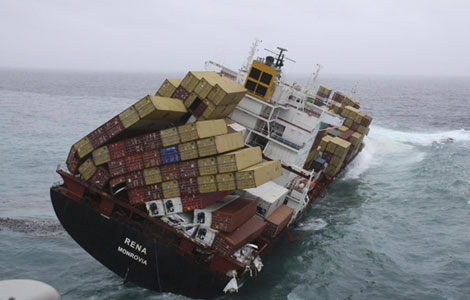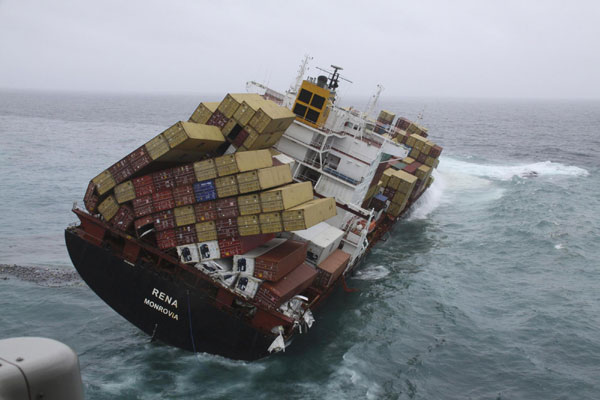NZ's oil spills to have long-term impacts
Updated: 2011-10-12 17:55
(Xinhua)
|
|||||||||||
CANBERRA - Australian and New Zealand's experts on Wednesday said that New Zealand oil spills will not only have long term negative impacts on local environment, but the oil will also enters the global oceans through other mechanisms.
A cargo ship, Rena, struck a New Zealand reef and has been spilling around 50 tonnes of oil into the Bay of Plenty, North Island of New Zealand since last Wednesday. New Zealand maritime authorities said "fist-sized patties" of oil have washed up on New Zealand's Mt Maunganui beach and tonnes more expected to land on Bay of Plenty beaches further south.
According to Australia's Commonwealth Scientific and Industrial Research Organization (CSIRO) research scientist Professor Nic Bax, hydrocarbons impact the environment and plants and animals through several different pathways.
Physically, the oil will affect through smothering or the external oiling of birds and marine mammals, and chemically through the toxicity of the compounds entering the animal itself causing different levels of short and long-term poisoning.
"While the impacts of oil spills are visually alarming with high local impact, far more oil enters the global oceans through other mechanisms," Professor Bax, who leads the Biodiversity Hub at Australia's University of Tasmania, told Xinhua.
"Local environmental impacts of oil spills will continue after the obvious tarry oil has been removed or dispersed. This is at least in part because some oil seems to usually remain hidden at depth in the sediments." Professor Bax said oil will eventually be broken down by natural processes including microbial activity, but it seems to be a long-term process because oil has been detected in sediments a decade after oil spills have occurred.
New Zealand National Institute of Water and Atmospheric Research (NIWA) marine ecologist, Dr Drew Lohrer agreed, saying that naturally occurring micro-organisms will help to break down hydrocarbons, but oil will arrive at the coast much more quickly than the bacteria can break it down.
"In areas where the oil arrives in thick slicks or clumps, it may take years or decades for it to disappear naturally. This is why it is imperative to clean up as much of the spill as possible" ," Dr Logrer told Xinhua in an email note.
He said that a significant slick of black oil has the potential to damage wildlife and the functioning of the ecological systems in coastal systems, including sandy and muddy inter-tidal flats.
He added that the black oil can smother the small creatures living on and in the sediments, and the oil's toxicity can cause longer term problems for the animals that do not immediately succumb.
The pair agreed that spraying of dispersants can disperse the oil though the water column, and may also help the birds and larger fauna by breaking up the larger thicker slicks and globules. However, the pair said the effects of more diffuse and widespread toxicity are unknown.
Hot Topics
Libya conflict, Gaddafi, Oil spill, Palace Museum scandal, Inflation, Japan's new PM, Trapped miners, Mooncake tax, Weekly photos, Hurricane Irene
Editor's Picks

|

|

|

|

|

|








